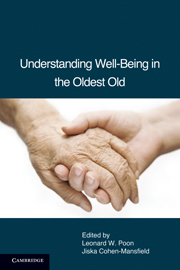Book contents
- Frontmatter
- Contents
- List of Tables
- List of Contributors
- Foreword by Carol D. Ryff
- PART I THEORY: NEW HORIZONS IN WELL-BEING RESEARCH
- PART II PARADISE LOST: BETWEEN TRAUMA AND HAPPINESS
- PART III PATHWAYS AND GATEKEEPERS: MODERATING, MEDIATING, AND PROXIMAL PROCESSES
- PART IV SIGNPOSTING PARADISE: MEASUREMENT OF WELL-BEING
- 15 Culture and Meaning: Strategies for Understanding the Well-Being of the Oldest Old
- 16 The Will to Live as an Indicator of Well-Being and Predictor of Survival in Old Age
- 17 The Measurement of Life Satisfaction and Happiness in Old-Old Age
- 18 Late-Life Psychotherapy: Challenges and Opportunities to Enhance Well-Being in the Oldest Old
- 19 An Integrative Summary and Future Directions in the Study of Well-Being
- Index
- References
19 - An Integrative Summary and Future Directions in the Study of Well-Being
Published online by Cambridge University Press: 05 August 2012
- Frontmatter
- Contents
- List of Tables
- List of Contributors
- Foreword by Carol D. Ryff
- PART I THEORY: NEW HORIZONS IN WELL-BEING RESEARCH
- PART II PARADISE LOST: BETWEEN TRAUMA AND HAPPINESS
- PART III PATHWAYS AND GATEKEEPERS: MODERATING, MEDIATING, AND PROXIMAL PROCESSES
- PART IV SIGNPOSTING PARADISE: MEASUREMENT OF WELL-BEING
- 15 Culture and Meaning: Strategies for Understanding the Well-Being of the Oldest Old
- 16 The Will to Live as an Indicator of Well-Being and Predictor of Survival in Old Age
- 17 The Measurement of Life Satisfaction and Happiness in Old-Old Age
- 18 Late-Life Psychotherapy: Challenges and Opportunities to Enhance Well-Being in the Oldest Old
- 19 An Integrative Summary and Future Directions in the Study of Well-Being
- Index
- References
Summary
ABSTRACT
This chapter integrates and summarizes our collective thinking on well-being among the old-old by answering five central questions: 1) What is old-old age?; 2) What is well-being in old-old persons?; 3) What affects well-being in old-old age?; 4) What theory, if any, is appropriate for old-old age?; 5) What interventions, if at all, are needed to enhance well-being in old-old age? It is hoped that our discourse will generate new research and directions toward well-being among old-old at the end stage of life.
INTRODUCTION
We began this volume with a road map to increase our knowledge on well-being among the oldest old. We designed this volume to include different views on well-being, the impact of experiences and trauma accumulated over the lifetime, mediating and moderating influences, and measurement issues.
At the end of this journey of inquiry, we are able to summarize and integrate our effort. As a scientific endeavor, this book both answers questions and raises others. The book aims to answer questions about the essence of well-being in very old age and the predictors of such status. Some findings repeat and are consistent across populations and studies, whereas some of the chapters present diverse and conflicting points of view. To integrate the results of the different chapters and focus the discussion, we concentrate on five questions that traverse the chapters:
What is old-old age?
What is well-being in old-old persons?
What affects well-being in old-old age?
What theory, if any, is appropriate for old-old age?
What interventions, if at all, are needed to enhance well-being in old-old age?
Information
- Type
- Chapter
- Information
- Understanding Well-Being in the Oldest Old , pp. 364 - 378Publisher: Cambridge University PressPrint publication year: 2011
References
Accessibility standard: Unknown
Why this information is here
This section outlines the accessibility features of this content - including support for screen readers, full keyboard navigation and high-contrast display options. This may not be relevant for you.Accessibility Information
- 1
- Cited by
